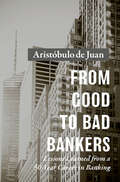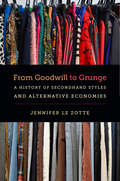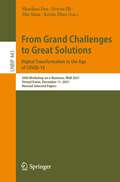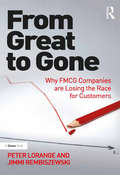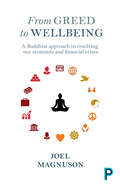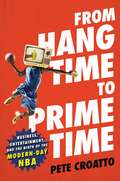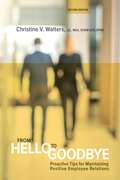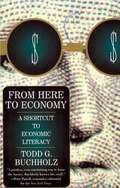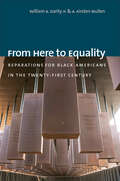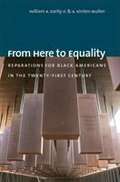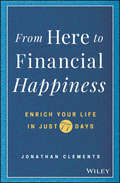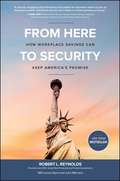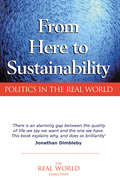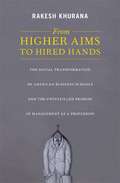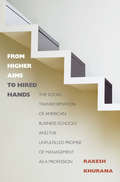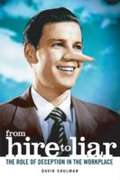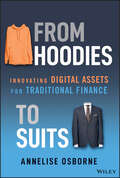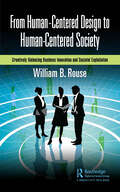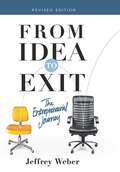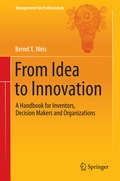- Table View
- List View
From Good to Bad Bankers: Lessons Learned from a 50-Year Career in Banking
by Aristóbulo de JuanBankers are administrators of other people’s money, and they are responsible both to their depositors and to other stakeholders. Human nature being what it is, however, they sometimes fall prey to overweening ambition, coming to see themselves as the rightful beneficiaries of the moneys entrusted to them. This can lead them to make poor lending decisions and engage in risky practices, eventually moving on to cosmetic accounting and the concealment of problems, speculation and even outright fraud.Supervisors are there to prevent such behaviour, of course. They are responsible to government and the general public alike for the stability of the financial system, the proper allocation of financial resources by the banks and the protection of depositors and creditors. Their responsibility is, then, subsidiary to that of the bankers themselves.Where supervision is lax and ineffective, however, it encourages bad management by bankers, creating a vicious circle that eventually leads to financial crises, which has most often to be cured using tax-payers’ money. Of course, it also hurts the broader economy. That is why the inseparable trio of regulation, supervision and resolution must exist.In this collection of his writings over a period of some 50 years, Aristóbulo de Juan describes the causes, characteristics and consequences of financial crises based on his own experience as a central banker, world bank expert and consultant spanning a career of more than 55 years.In a nutshell, the papers brought together in this book recount circumstances that have always plagued banking, and that are only too likely to recur in the future.
From Goods to a Good Life: Intellectual Property and Global Justice
by Madhavi SunderMost scholarship on intellectual property considers this law from the standpoint of law and economics. Under this conventional wisdom, intellectual property is simply a tool for promoting innovative products, from iPods to R2D2. In this highly original book Madhavi Sunder calls for a richer understanding of intellectual property law's effects on social and cultural life. Intellectual property does more than incentivize the production of more goods. This law fundamentally affects the ability of citizens to live a good life. Intellectual property law governs the abilities of human beings to make and share culture, and to profit from this enterprise in a global Knowledge economy. This book turns to social and cultural theory to more fully explore the deep connections between cultural production and human freedom.
From Goodwill to Grunge: A History of Secondhand Styles and Alternative Economies (Studies in United States Culture)
by Jennifer Le ZotteIn this surprising new look at how clothing, style, and commerce came together to change American culture, Jennifer Le Zotte examines how secondhand goods sold at thrift stores, flea markets, and garage sales came to be both profitable and culturally influential. Initially, selling used goods in the United States was seen as a questionable enterprise focused largely on the poor. But as the twentieth century progressed, multimillion-dollar businesses like Goodwill Industries developed, catering not only to the needy but increasingly to well-off customers looking to make a statement. Le Zotte traces the origins and meanings of "secondhand style" and explores how buying pre-owned goods went from a signifier of poverty to a declaration of rebellion.Considering buyers and sellers from across the political and economic spectrum, Le Zotte shows how conservative and progressive social activists--from religious and business leaders to anti-Vietnam protesters and drag queens--shrewdly used the exchange of secondhand goods for economic and political ends. At the same time, artists and performers, from Marcel Duchamp and Fanny Brice to Janis Joplin and Kurt Cobain, all helped make secondhand style a visual marker for youth in revolt.
From Grand Challenges to Great Solutions: 20th Workshop on e-Business, WeB 2021, Virtual Event, December 11, 2021, Revised Selected Papers (Lecture Notes in Business Information Processing #443)
by Kexin Zhao Shaokun Fan Noyan Ilk Zhe ShanThis book constitutes revised selected papers from the 20th Workshop on e-Business, WeB 2021, which took place virtually on December 11, 2021.The purpose of WeB is to provide a forum for researchers and practitioners to discuss findings, novel ideas, and lessons learned to address major challenges and map out the future directions for e-Business. The WeB 2021 theme was “From Grand Challenges to Great Solutions: Digital Transformation in the Age of COVID-19.” The 8 papers included in this volume were carefully reviewed and selected from a total of 24 submissions. The contributions are organized in topical sections as follows: digital innovation and transformation, and e-commerce and social media.
From Great to Gone: Why FMCG Companies are Losing the Race for Customers
by Peter Lorange Jimmi RembiszewskiThe modern consumer is no longer attracted by single-minded, predictable and one-benefit-focused brand promises. The old-fashioned FMCG communication strategies based on television, radio and print with constant repetition have become outdated. From Great to Gone shows that what’s needed are ’Lego’ strategies, whereby the marketing and communication strategies are built up by many key facets (like building blocks) and delivered to the consumer through a mix of various touch points. Most importantly, you need to leave consumers to put all of that together themselves. There are major internal and external hurdles to transforming FMCGs successfully into FICGs - Fast Innovating Consumer Goods. It requires new brand strategies and flatter, more top-down than bottom-up, decision-making organisations and a 21st-century model for advertising agencies. Externally these companies need a new route to market through transformation of their old retail dependencies. Changes are also required in all communication delivery, reflecting modern consumers’ connectivity and unlimited access to information. In the book the authors showcase what the winners of the 21st century have in common that has enabled them to become FICGs. New, unimagined models continue emerge, to which, with the authors’ guidance producers and retailers may develop their own sustainable responses.
From Greed to Wellbeing: A Buddhist Approach to Resolving Our Economic and Financial Crises
by Joel MagnusonDespite our fitful attempts over decades at reform, the global financial system seems caught in cycles of boom and bust, instability, and scandal. In this timely new book, Joel Magnuson builds on the classic works of E. F. Schumacher and other kindred spirits to provide a Buddhist economics perspective on this recurring pattern, and offers new possibilities for real change. The book centers on the belief that greed, aggression, and delusion (Buddhism’s “three poisons”) are embedded within our financial institutions and that they perpetuate the continued widespread attachment to endless economic growth and financial accumulation that are responsible for social and ecological malaise. Arguing that mainstream economics fails to adequately address this cycle, Magnuson presents a new framework of Buddhist economics, helping readers gain a deeper understanding of current economic problems and offering a course toward genuine wellbeing.
From Group Conflict to Social Harmony: Leading Across Diverse and Conflicting Social Identities
by Michael A. HoggLeaders almost always must provide leadership for a constituency that encompasses not merely diverse individuals but also diverse groups that in many cases simply do not get along. More often than not, the great challenge of leadership is in being an effective intergroup leader. Another, often underappreciated feature of effective leadership is the ability to provide a constituency with a shared identity that embodies a single vision and common set of values, attitudes, goals, and practices. This chapter explores the dynamics of intergroup leadership from the perspective of social identity theory, a social psychology theory that explores the psychological relationships between self-conception and the behavior of people within and between groups. Specifically, the author looks at how leaders who are considered by a group's members to best embody the group's defining attributes can be most effective. This chapter was previously published as chapter 2 of "Crossing the Divide: Intergroup Leadership in a World of Difference."
From Hang Time to Prime Time: Business, Entertainment, and the Birth of the Modern-Day NBA
by Pete CroattoPerfect for fans of Moneyball and The Book of Basketball, this vivid, thoroughly entertaining, and well-researched book explores the NBA&’s surge in popularity in the 1970s and 1980s and its transformation into a global cultural institution. Far beyond simply being a sports league, the NBA has become an entertainment and pop culture juggernaut. From all kinds of team logo merchandise to officially branded video games and players crossing over into reality television, film, fashion lines, and more, there is an inseparable line between sports and entertainment. But only four decades ago, this would have been unthinkable. Featuring writing that leaps off the page with energy and wit, journalist and basketball fan Pete Croatto takes us behind the scenes to the meetings that lead to the monumental American Basketball Association–National Basketball Association merger in 1976, revolutionizing the NBA&’s image. He pays homage to legendary talents including Julius &“Dr. J&” Erving, Magic Johnson, and Michael Jordan and reveals how two polar-opposite rookies, Larry Bird and Magic Johnson, led game attendance to skyrocket and racial lines to dissolve. Croatto also dives into CBS&’s personality-driven coverage of key players, as well as other cable television efforts, which launched NBA players into unprecedented celebrity status. Essential reading whether you&’re a casual or longtime fan, From Hang Time to Prime Time is an enthralling and entertaining celebration of basketball history.
From Head Shops to Whole Foods: The Rise and Fall of Activist Entrepreneurs
by Joshua C. DavisIn the 1960s and '70s, a diverse range of storefronts--including head shops, African American bookstores, feminist businesses, and organic grocers--brought the work of the New Left, Black Power, feminism, environmentalism, and other movements into the marketplace. Through shared ownership, limited growth, and democratic workplaces, these activist entrepreneurs offered alternatives to conventional profit-driven corporate business models. By the middle of the 1970s, thousands of these enterprises operated across the United States--but only a handful survive today. Some, such as Whole Foods Market, have abandoned their quest for collective political change in favor of maximizing profits. Vividly portraying the struggles, successes, and sacrifices of these unlikely entrepreneurs,From Head Shops to Whole Foodswrites a new history of social movements and capitalism by showing how activists embraced small businesses in a way few historians have considered. The book challenges the widespread but mistaken idea that activism and political dissent are inherently antithetical to participation in the marketplace. Joshua Clark Davis uncovers the historical roots of contemporary interest in ethical consumption, social enterprise, buying local, and mission-driven business, while also showing how today's companies have adopted the language--but not often the mission--of liberation and social change.
From Head Shops to Whole Foods: The Rise and Fall of Activist Entrepreneurs (Columbia Studies in the History of U.S. Capitalism)
by Joshua DavisIn the 1960s and ’70s, a diverse range of storefronts—including head shops, African American bookstores, feminist businesses, and organic grocers—brought the work of the New Left, Black Power, feminism, environmentalism, and other movements into the marketplace. Through shared ownership, limited growth, and democratic workplaces, these activist entrepreneurs offered alternatives to conventional profit-driven corporate business models. By the middle of the 1970s, thousands of these enterprises operated across the United States—but only a handful survive today. Some, such as Whole Foods Market, have abandoned their quest for collective political change in favor of maximizing profits.Vividly portraying the struggles, successes, and sacrifices of these unlikely entrepreneurs, From Head Shops to Whole Foods writes a new history of social movements and capitalism by showing how activists embraced small businesses in a way few historians have considered. The book challenges the widespread but mistaken idea that activism and political dissent are inherently antithetical to participation in the marketplace. Joshua Clark Davis uncovers the historical roots of contemporary interest in ethical consumption, social enterprise, buying local, and mission-driven business, while also showing how today’s companies have adopted the language—but not often the mission—of liberation and social change.
From Hello to Goodbye: Proactive Tips for Maintaining Positive Employee Relations
by Christine V. WaltersUnderstanding the full scope of the employee experience - from entry to exit - strengthens HR's impact and mitigates risk. Evaluating the complete employment relationship in reverse - from departure through hire - From Hello to Goodbye is the HR professional's complete guide to understanding the various ways business relationships end, managing disability and leave issues, properly classifying workers, maintaining an inclusive workplace, increasing retention and avoiding litigation.This updated second edition incorporates new legal developments, best practices and compliance requirements while offering practical advice on managing emotional reactions, making the case for inclusion and addressing workplace safety.A trusted resource for HR professionals, the book blends legal insight with hands-on tips to support both people and organizational health.
From Here to Economy
by Buchholz Todd G.What is the GDP, and what does it mean? Why does the stock market go down when interest rates go up? What causes a dreaded recession? Economics impacts everyone's life, but most people take on faith what they read in the newspaper. Now, for anyone who doesn't know much about economics, noted economist Todd Buchholz explains it all simply and clearly. With refreshing wit and irreverence, Buchholz takes readers by the hand and reveals the basic rules behind everything from food prices to trade deficits. Instead of complicated graphs and charts he uses examples from contemporary life and popular culture to demonstrate the principles at work. By cutting through the arcane musings of academicians, the jargon of analysts and advisors, and the rhetoric of politicians, he gives us a precise and accessible understanding of economic ideas, actions, and consequences as they actually exist in the here and now. Here are some of the heretofore unintelligible ideas he helps us to understand: what causes or combats inflation, and why it is so feared; what moves stocks and bonds up and down - and how to invest wisely and safely; whether it is good or bad to "protect" America from foreign goods - and what happens when we do and when we don't; what exactly Social Security is, and whether government spending is good or bad - and how dangerous the national debt is or isn't. In today's confusing economic climate, it has never been more important for everyone from homemakers to small-business owners to individual investors and middle managers to understand the forces at work. .
From Here to Equality: Reparations for Black Americans in the Twenty-First Century
by William A. Darity A. Kirsten MullenRacism and discrimination have choked economic opportunity for African Americans at nearly every turn. At several historic moments, the trajectory of racial inequality could have been altered dramatically. Perhaps no moment was more opportune than the early days of Reconstruction, when the U.S. government temporarily implemented a major redistribution of land from former slaveholders to the newly emancipated enslaved. But neither Reconstruction nor the New Deal nor the civil rights struggle led to an economically just and fair nation. Today, systematic inequality persists in the form of housing discrimination, unequal education, police brutality, mass incarceration, employment discrimination, and massive wealth and opportunity gaps. Economic data indicates that for every dollar the average white household holds in wealth the average black household possesses a mere ten cents. In From Here to Equality, William Darity Jr. and A. Kirsten Mullen confront these injustices head-on and make the most comprehensive case to date for economic reparations for U.S. descendants of slavery. After opening the book with a stark assessment of the intergenerational effects of white supremacy on black economic well-being, Darity and Mullen look to both the past and the present to measure the inequalities borne of slavery. Using innovative methods that link monetary values to historical wrongs, they next assess the literal and figurative costs of justice denied in the 155 years since the end of the Civil War. Finally, Darity and Mullen offer a detailed roadmap for an effective reparations program, including a substantial payment to each documented U.S. black descendant of slavery. Taken individually, any one of the three eras of injustice outlined by Darity and Mullen--slavery, Jim Crow, and modern-day discrimination--makes a powerful case for black reparations. Taken collectively, they are impossible to ignore.
From Here to Equality: Reparations for Black Americans in the Twenty-first Century
by William A. Darity A. Kirsten MullenRacism and discrimination have choked economic opportunity for African Americans at nearly every turn. At several historic moments, the trajectory of racial inequality could have been altered dramatically. Perhaps no moment was more opportune than the early days of Reconstruction, when the U.S. government temporarily implemented a major redistribution of land from former slaveholders to the newly emancipated enslaved. But neither Reconstruction nor the New Deal nor the civil rights struggle led to an economically just and fair nation. Today, systematic inequality persists in the form of housing discrimination, unequal education, police brutality, mass incarceration, employment discrimination, and massive wealth and opportunity gaps. Economic data indicates that for every dollar the average white household holds in wealth the average black household possesses a mere ten cents. <P><P> In From Here to Equality, William Darity Jr. and A. Kirsten Mullen confront these injustices head-on and make the most comprehensive case to date for economic reparations for U.S. descendants of slavery. After opening the book with a stark assessment of the intergenerational effects of white supremacy on black economic well-being, Darity and Mullen look to both the past and the present to measure the inequalities borne of slavery. Using innovative methods that link monetary values to historical wrongs, they next assess the literal and figurative costs of justice denied in the 155 years since the end of the Civil War. Finally, Darity and Mullen offer a detailed roadmap for an effective reparations program, including a substantial payment to each documented U.S. black descendant of slavery. Taken individually, any one of the three eras of injustice outlined by Darity and Mullen--slavery, Jim Crow, and modern-day discrimination--makes a powerful case for black reparations. Taken collectively, they are impossible to ignore.
From Here to Financial Happiness: Enrich Your Life in Just 77 Days
by Jonathan ClementsJust 77 days to a happier, more prosperous life! From Here to Financial Happiness is the day-by-day guide for anyone dreaming of a better life. Whether you’re dealing with debt, uncertain about retirement or simply want to get a grip on your finances, this book can put you on the road to happiness with a simple 11-week journey. Just 5-10 minutes a day to think about money, your habits, your goals, and your dreams. What steps can you take today to get your finances on track? What bad habits, bad investments, and misconceptions should you let go of? This book is packed with 77 days’ worth of real, actionable guidance for getting your money right—for good. It’s not an investment scheme, not extreme couponing, not something else to add to your daily to-do list. Instead, it’s about changing you—and the way you handle and think about money—so you can start building the life of your dreams. The next 11 weeks will be a revelation: Some days you’ll learn about finance, other days you’ll learn about yourself. Many days, you will be given a concrete list of things to do—right at that moment—to start steering your financial situation onto the right path. Learn how to stack the financial odds in your favor Amass savings for retirement, the children’s college or that next financial emergency Change your perspective on money and its role in your life Get your financial house in order—and keep it that way A better life is possible. You do have the power to change things for the better. From Here to Financial Happiness is your personal roadmap to financial freedom.
From Here to Security: How Workplace Savings Can Keep America's Promise
by Robert L. Reynolds Lenny Glynn John MitchemAt a time of fierce political divisiveness, From Here to Security is a refreshingly balanced, non-ideological guide to solving what may be our nation’s most pressing policy challenge: achieving retirement security for all. <P><P>A pioneer of the 401(k) system, Robert L. Reynolds eschews radical calls for throwing out the 401(k) entirely and creating a new government-run savings system. Our best course, he shows, is to build on what we have: a flexible, dynamic private-public system of Social Security and more robust workplace savings. From Here to Security provides a clear, powerful new approach to solving America’s retirement challenge – based on facts, data, and Reynolds’ decades of experience. <P><P>While fear-mongers claim that the U.S. retirement system is on the verge of collapse; Reynolds shows why our system is actually the envy of the world. But From Here to Security is no status quo book. <P><P>Reynolds lays out an action agenda to dramatically improve our retirement systems – public and private – lift our savings rate, improve people’s retirement prospects, spur faster growth – and reboot America’s national morale.
From Here to Sustainability: Politics in the Real World
by Ian ChristieFor a large proportion of the electorate, national politics misses the real issues. As a result, membership of campaigning organizations has soared whilst party numbers have declined. This work distils the principles and priorities of many of the leading voluntary groups into a strong and coherent programme of political aims and actions. The problem can be measured as a sustainability gap - between official policies and achievements and actual democratic participation, environmental restoration and the eradication of poverty. With examples and short case studies, the book translates the gap into practical and realistic recommendations for progress.
From Higher Aims to Hired Hands: The Social Transformation of American Business Schools and the Unfulfilled Promise of Management as a Profession
by Rakesh Khurana"I have been waiting for years for someone to write the definitive institutional history of U. S. management education, and this is it. From the standpoint of most analytic definitions of 'professional,'the term 'professional manager' is enigmatic, even oxymoronic. Rakesh Khurana's thorough, insightful, provocative, and courageous history of business education explains how this term came to make practical and cultural sense to a generation of Americans, and how its logic has been undermined in the past thirty years. "From Higher Aims to Hired Hands" is an exemplary work of institutional analysis, combining first-rate historiography with outstanding social-science scholarship. It will be essential reading for business historians, students of management and organizations, and faculty, administrators, and thoughtful students at America's business schools. "--Paul DiMaggio, Princeton University" "From Higher Aims to Hired Hands" is a tour de force. With profound depth and sweeping scope, Rakesh Khurana analyses the rise and potential fall of a uniquely American institution--one that has influenced management education throughout the world. His book contributes significantly to explaining how managerial capitalism could go awry and how to restore the moral underpinnings that would make management the profession of leadership. In addition to offering fascinating history lessons based on exhaustive research, Khurana adds new twists to institutional theory and points to future directions for educational practice. "--Rosabeth Moss Kanter, Harvard Business School, author of "The Change Masters, Confidence," and "America the Principled: 6 Opportunities for Becoming a Can-Do Nation OnceAgain" "This panoramic portrait of the origins and ramifications of American business education is quite remarkable, rich in detail, powerful in the marshaling of evidence, and provocative in its claims. Khurana writes with confidence, authority, and erudition. "--Walter Powell, Stanford University "This is a wonderful and important book for anyone interested in business education. There is a tendency for those of us involved in business education to think that we understand the dynamics of our industry and that there is little new that we can learn. How wrong such a judgment would be. In providing a sociological understanding of the origins of business education and the professionalization of management, this book prompts deep reflection about the state of management today and offers real insight into the challenges of elevating the standards of this particular profession. "--Joel Podolny, dean of Yale School of Management
From Higher Aims to Hired Hands: The Social Transformation of American Business Schools and the Unfulfilled Promise of Management as a Profession
by Rakesh KhuranaIs management a profession? Should it be? Can it be? This major work of social and intellectual history reveals how such questions have driven business education and shaped American management and society for more than a century. The book is also a call for reform. Rakesh Khurana shows that university-based business schools were founded to train a professional class of managers in the mold of doctors and lawyers but have effectively retreated from that goal, leaving a gaping moral hole at the center of business education and perhaps in management itself. Khurana begins in the late nineteenth century, when members of an emerging managerial elite, seeking social status to match the wealth and power they had accrued, began working with major universities to establish graduate business education programs paralleling those for medicine and law. Constituting business as a profession, however, required codifying the knowledge relevant for practitioners and developing enforceable standards of conduct. Khurana, drawing on a rich set of archival material from business schools, foundations, and academic associations, traces how business educators confronted these challenges with varying strategies during the Progressive era and the Depression, the postwar boom years, and recent decades of freewheeling capitalism. Today, Khurana argues, business schools have largely capitulated in the battle for professionalism and have become merely purveyors of a product, the MBA, with students treated as consumers. Professional and moral ideals that once animated and inspired business schools have been conquered by a perspective that managers are merely agents of shareholders, beholden only to the cause of share profits. According to Khurana, we should not thus be surprised at the rise of corporate malfeasance. The time has come, he concludes, to rejuvenate intellectually and morally the training of our future business leaders.
From Hire to Liar: The Role of Deception in the Workplace
by David ShulmanThis book offers a sociological study of the rationales for, and methods of, workplace deception. The author begins by presenting an ethnographic analysis of private detectives' routine use of deception as an officially-sanctioned component of their work. He then uses interviews and case-studies to show how similar strategies are used in a variety of other work environments. The author discusses the justification and effects of workplace deception on both workers and employers.
From Hoodies to Suits: Innovating Digital Assets for Traditional Finance
by Annelise OsborneLearn how digital asset technologies can be applied to the regulated, traditional finance industry for improved performance and returns In From Hoodies to Suits: Innovating Digital Assets for Traditional Finance, leading finance innovator Annelise Osborne bridges the gap between the “hoodies” who invented the technology behind digital assets and the “suits” who run traditional financial markets, in an entertaining and insightful guide for implementing digital assets in an institutional environment. You’ll discover the possibilities unlocked by new technological advancements, including alternative investments, new marketplaces, interoperability between counterparties, and even improved forms of diversification. You’ll also find: Discussions of why the adoption of digital assets is so critical for the future of finance and the ways the industry’s largest players are implementing its technologies and concepts now Explorations of what we can learn from some of the crypto industry’s most infamous and well-known wins and losses, including the collapse of FTX Strategies for implementing institutional digital assets to realize opportunities in private markets, funds, debt, repo, alternative assets and back office transactions in this evolving and dynamic financial environmentA fascinating new take on the future of finance, From Hoodies to Suits is a must-read guide for aspiring and practicing finance professionals, technology developers, fintech participants, and anyone else with an interest in the intersection of finance and technology.
From Human-Centered Design to Human-Centered Society: Creatively Balancing Business Innovation and Societal Exploitation
by William B. RouseA human-centered society creatively balances investments in sources of innovation, while also governing in a manner that eventually limits exploitation by originators once innovations have proven their value in the marketplace, broadly defined to include both private and public constituencies. The desired balance requires society to invest in constituencies to be able to create innovations that provide current and future collective benefits, while also assuring society provides laws, courts, police, and military to protect individual rights to life, liberty, and the pursuit of happiness. The balance addresses collectivism vs. individualism. Collectivism emphasizes the importance of the community. Individualism, in contrast, is focused on the rights and concerns of each person. Unity and selflessness or altruism are valued traits in collectivist cultures; independence and personal identity are central in individualistic cultures. Collectivists can become so focused on collective benefits that they ignore sources and opportunities for innovation. Individualists can tend to invest themselves, almost irrationally, in ideas and visions, many of which will fail, but some will transform society. Collectivists need to let individualists exploit their successful ideas. Individualists need to eventually accept the need to provide collective benefits. This book addresses the inherent tension underlying the pursuit of this balance. It has played a central role in society at least since the Industrial Revolution (1760–1840). Thus, the story of this tension, how it regularly emerges, and how it is repeatedly resolved, for better or worse, is almost a couple of centuries old. Creating a human-centered society can be enabled by creatively enabling this balance. Explicitly recognizing the need for this balance is a key success factor. This book draws upon extensive experiences within the domains of transportation and defense, computing and communications, the Internet and social media, health and wellness, and energy and climate. Balancing innovation and exploitation takes varying forms in these different domains. Nevertheless, the underlying patterns and practices are sufficiently similar to enable important generalizations.
From Idea to Exit: The Entrepreneurial Journey
by Jeffrey WeberWhile most small business books cover niche components of the start-up model, From Idea to Exit takes a more comprehensive approach, tackling the entire entrepreneurial journey from the initial seed idea through a well-planned exit strategy. Through a persuasive narrative, the author draws from his own success a practical call to action for those who dream of taking that first big step.
From Idea to Innovation
by Bernd X. WeisThe book assists in bringing together the three stakeholders of an innovation - inventor, decision maker and organization. These stakeholders have conflicting requirements and the book offers advice on how and by what methods they can communicate and the information that is expected and required in different phases of innovation. The perspectives of inventor, decision maker and organization are integrated in a business model that enables a common "language" and communication platform for the inevitably emerging tension field and that allows for asking and answering the right questions.
